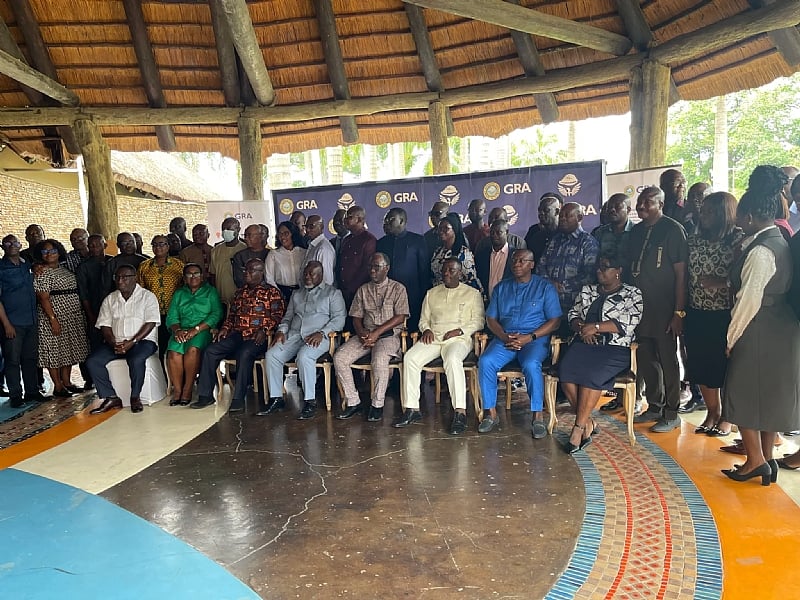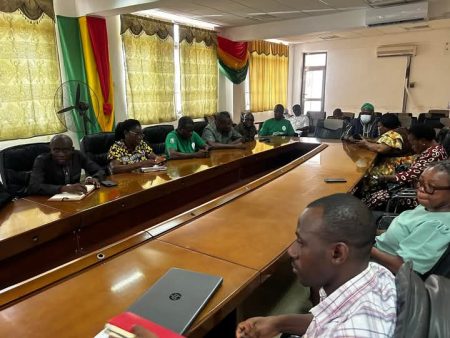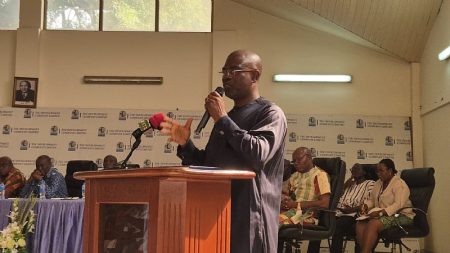Finance Minister Dr. Cassiel Ato Forson has issued a call to action to the Ghana Revenue Authority (GRA), urging them to embrace the ambitious GH¢200 billion revenue target for 2025 not as an insurmountable burden but as a catalyst for positive change and innovation within the tax collection system. Addressing the GRA Management Retreat, Dr. Forson emphasized the need for a strategic shift in approach, encouraging tax officials to explore novel methods of revenue generation while simultaneously prioritizing efficiency and customer satisfaction. He framed the challenging target as an opportunity for the GRA to reinvent itself, becoming a more resilient and responsive institution capable of meeting the evolving demands of the Ghanaian economy. The Minister underscored the government’s commitment to creating a more equitable and effective tax system, highlighting reforms such as the removal of the Electronic Transfer Levy and ongoing revisions to the Value Added Tax (VAT) system as key steps in this direction. These changes aim to alleviate the tax burden on individuals and businesses while simultaneously bolstering revenue collection, a delicate balancing act crucial for sustainable economic growth.
Dr. Forson’s address underscored the government’s broader agenda of comprehensive tax reform, a multifaceted approach aimed at enhancing compliance, streamlining processes, and ensuring fairness within the tax system. The repeal of the Electronic Transfer Levy, a contentious tax that faced public resistance, signals the government’s willingness to listen to public concerns and adapt its policies accordingly. Coupled with the promised adjustments to the VAT system, these reforms are designed to create a more conducive tax environment, encouraging voluntary compliance and reducing the administrative burden on both taxpayers and the GRA. The ultimate goal is to establish a robust and sustainable revenue stream that can support the government’s development agenda without unduly impacting the economic well-being of citizens and businesses.
This focus on reforming the tax landscape reflects a recognition that a well-functioning tax system is essential for financing public services, promoting economic development, and ensuring social equity. By simplifying tax laws, improving transparency, and enhancing taxpayer services, the government aims to foster trust and cooperation between taxpayers and the GRA. This collaborative approach is expected to yield significant long-term benefits, leading to increased tax revenue and a more equitable distribution of the tax burden.
The GRA’s Commissioner-General, Mr. Anthony Kwasi Sarpong, echoed the Minister’s sentiments, emphasizing the crucial role of innovation and efficiency in achieving the ambitious revenue target. He outlined the GRA’s commitment to embracing modern technologies and data-driven strategies to enhance tax collection efforts. This includes adopting smarter enforcement strategies to curb tax evasion, improving taxpayer services to facilitate compliance, and strengthening digital tax systems to streamline processes and reduce administrative costs. Mr. Sarpong’s statements highlight the GRA’s recognition that achieving the GH¢200 billion target requires a fundamental shift in how the institution operates, moving towards a more proactive, technology-driven, and customer-centric approach.
Central to the GRA’s strategy is a renewed focus on engaging with taxpayers, promoting a culture of dialogue and collaboration. Mr. Sarpong stressed the importance of a customer-centric approach, emphasizing the need for cordial and respectful interactions between tax officials and taxpayers. This approach recognizes that taxpayer cooperation is essential for effective revenue collection and aims to build trust and understanding between the GRA and the public. By adopting a more service-oriented mindset, the GRA aims to transform its image from a punitive body to a supportive partner in ensuring tax compliance.
The GRA’s commitment to expanding the tax base is a critical component of its revenue mobilization strategy. This involves identifying and registering new taxpayers, particularly those operating in the informal sector. By bringing more individuals and businesses into the tax net, the GRA aims to broaden the revenue base and reduce reliance on a smaller group of taxpayers. This effort will require targeted outreach programs and simplified registration processes to encourage voluntary compliance from those currently outside the formal tax system. Furthermore, tackling tax evasion remains a priority, with the GRA focusing on strengthening enforcement mechanisms and leveraging data analytics to identify and address non-compliance. Streamlining internal processes within the GRA is also crucial for enhancing efficiency and reducing administrative bottlenecks. This will involve simplifying tax procedures, automating tasks, and improving data management to optimize resource utilization and ensure timely processing of tax returns and payments. Through these combined efforts, the GRA aims to create a more efficient, effective, and equitable tax system that contributes to Ghana’s economic prosperity.














